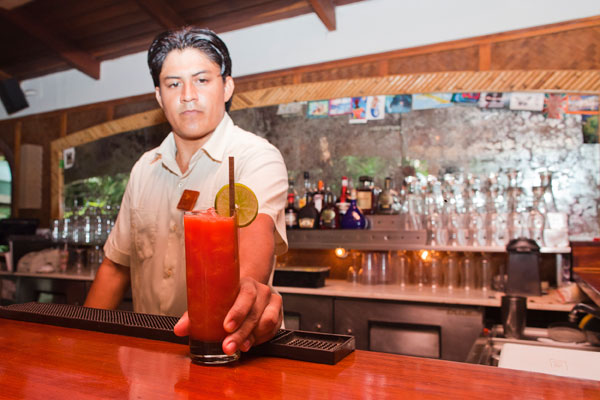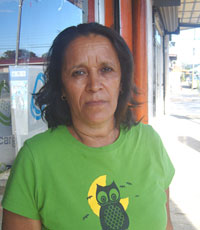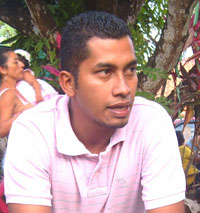|

When it comes to profits from the sale of liquor, both the owner of the bar and the owner of the liquor license that the bar utilizes can take a big slice of the pie. But only 300 colones per year of the liquor license use tax goes to the municipality Why? Because the law that regulates these licenses dates back to 1936.
Under the new Liquor Law, approved in the first instance on January 16, municipalities will receive more income from taxes on liquor licenses, which will be called "licencias" instead of "patentes." Municipal income for each license could be 180,000 colones ($360) or more per year.
The old liquor law offered many benefits to the license owners. Some owners don't use the licenses in their business but rather rent them to others at high prices. License rental fees could be as much as four million colones ($8,000) per month.
The new law's purpose is to organize the liquor license market and help increase municipal income.
The changes that will be seen
The old law said that there should be a distance of 400 meters between places where liquor is sold and educational centers, churches and medical centers. Also, only one license could be granted for every 300 inhabitants in the canton, and a license could only be issued to hotels that have a tourism endorsement from the Costa Rican Institute of Tourism (ICT).
Under the new law, liquor stores could be located as close as 200 meters from schools, but President Laura Chinchilla asked the representatives to change this aspect of the law in the second debate. The President believes that the restriction that establishes a minimum distance of 400 meters should be put back into the law.
Also, the new law says that new licenses granted by the municipality for the commercial sale of alcoholic beverages don't constitute an asset and thus they cannot be sold, traded, leased, transferred or reassigned in any way.
|
|
|
Dry law, not so dry now
The dry law is a prohibition on the sale of alcoholic beverages that is in effect Holy Thursday and Friday and also during Election Day, when the police place seals on the liquor stores and bars. Breaking the dry law means a penalty of jail for three months to 2 years.
This regulation will be eliminated under the new Liquor Law, and the municipalities will be the ones to determine whether or not they apply the dry law. Nicoya has not decided if it will or won't permit the sale of alcohol during the coming Holy Week, April 5th and 6th.
|
|
| |
|
|
|
| |
|
What do people think?
 |
|
Berny Juárez Zúñiga
Student
Nicoya
"I don't see anything wrong with it being the local government that decides what to do with the issue of the dry law. Really even if it is applied, people always are going to consume liquor on these two holy days."
|
 |
|
Xinia Baltodano Villarreal
Professor
Nambí, Nicoya
"It's good that they give the municipality power to decide this. Yes, I am in agreement with prohibiting selling liquor these two holy days; Holy Week has to be respected." |
 |
|
Diego Matarrita García
Curime
Construction Worker
"It would be good for the dry law to be suspended. It hasn't helped anything in any way. They always consume and I believe even more than on other days. So the law should be eliminated." |
|
|
This new restriction does not govern existing licenses, however. Miguel Guillen, assessor for the municipality of Nicoya, explained that those who currently have licenses will be able to continue renting the licenses but will not be able to sell them.
Collection of the new taxes can't be implemented yet. That must wait until the Legislature finishes approving the law that has to go for a second debate.
Guillen said that when the law is finally passed, the municipality must enact regulations to establish the taxes for both current and future licenses, and the increase could be substantial. "Upon the approval of the new law, the licensees will go from paying 75 colones per trimester to many thousands of colones, but regulations must be adopted before taxes can be applied," the municipal lawyer said.
The Municipality of Nicoya has 316 licenses registered in its seven districts, from which only 95,000 colones ($190) per year currently goes to the municipal government through payment of the tax. Under the proposed change, that income could rise to 60 million colones ($120,000) per year.
According to the 2011 census, Nicoya has a population of 48,556. That population should permit 161 licenses instead of 316. Marco Jimenez, mayor of Nicoya, said that as of now the Municipality doesn't intend to sell more licenses. |
|
|
Current Liquor Licenses by district:
Nicoya 121
Sámara 52
San Antonio 44
Nosara 42
La Mansión 30
Quebrada Honda 20
Belén 7
|
For Jimenez, reforming this law is going to make a significant change in the economic aspects of the licenses. But he's not convinced that it is going to give many benefits to the canton even though, by his criteria, some part of the new income should be used for social development purposes.
"Here in the canton we don't want to increase the consumption of alcohol, which is the cause of many traffic accidents. The Municipal Council should review this law, as they are the ones that have the authority to make changes in the licenses," pointed out the mayor.
With the reform, every license will be valid for five years and can be renewed automatically. Renewal would require that the license holders fulfill any legal conditions imposed at the time the extension is granted and that they be up to date in the payment of all of their obligations to the municipality.
Following due process, the municipality, subject to agreement of the Municipal Council, will be able to revoke the license of those businesses that violate the standards established in this law. If those responsible for the business tolerate illegal conduct, such as violence within their establishment, or if they personally are conducting activities distinct from those for which they requested their commercial permit or their license for dispensing alcoholic beverages, the license could be revoked.
Many might raise an eyebrow over the implementation of this initiative in near future. Others, like the municipality, will be rubbing their hands, knowing that they will see their income increase through payment of tributes, by which an old law had given them a disadvantage.
 |
| |
More Regional News
Mayor of Nicoya Takes a Rest For Health Problems
The mayor of Nicoya, Marco Antonio Jimenez, presented a disability notice on Monday, February 20th, before the Municipal Council because health problems impede him from exercising his labor for 22 days.
ASADA Nosara elects New Board of Directors
Old meter prices and water taps could return
At the Feb. 22 annual meeting of the water board (Asada) for the American Project, a new president was elected and outgoing President Rick Walker revealed some news for returning the ASADA to a sound financial structure.
Fire in the Nosara River Mouth Was Controlled by Firefighters
On Wednesday, February 22, residents of the Nosara river mouth were surprised when they saw a fire coming between the bank of the river and the bushes. The fire was the result of a bonfire left the night before, and it took Nosara’s volunteer fire brigade two hours to extinguish it.
Water Outages in the American Project to Continue through February
Periodic extended water outages may last another ten days throughout the American Project while the Asada, or water system, struggles with sputtering wells, budgetary, maintenance and personnel issues.
Motorcyclist Taken to Hospital after Accident in Barco Quebrado
William Garita Jimenez of Barco Quebrado was taken by ambulance to the hospital in Nicoya on Wednesday morning, February 15th after being hit by a truck.
OIJ Investigate Cause of Tuanis Fire
On Tuesday February 7, agents of the OIJ (Judicial Police) from San Jose were at “Tuanis” furniture manufacturer, which was burnt to the ground last Sunday, looking for evidence to determine if the fire had been intentionally set.
Fire Destroyed Furniture Manufacturer "Tuanis" in Guiones
On Sunday February 5th, around 7 AM, the furniture manufacturer "Tuanis", located on route 160 in Playa Nosara, went completely up in flames. Nosara volunteer firefighters were the first to reach the fire, using water from the pool at The Village Foods.
Better Late Than Never: The Montaña River Will Finally Have a Bridge
After Nosara and Ostional residents endlessly requested that the Government build a bridge over the Montaña River, it has finally become a reality. Since January 9th, machinery has been hard at work with breaking ground and opening the space needed to access the Bailey bridge.
Nicoya, Nosara and Samara Plan Projects for 2012 National Budget
Two motorcycles for the Public Force of Nosara, computers for schools in the district of Samara and new sidewalks for the park in Nicoya are the projects that have been selected for investing funds from the National Budget of Specific Items for 2012.
Danger at Samara Intersection
Bus Stop Locations Create Hazard for Drivers and Pedestrians
If someone isn't paying attention and using the proper caution, an accident could easily occur at the main intersection entering Samara, especially when buses are present, reducing visibility of oncoming traffic.
Municipal Power Struggle Hinders Budget for 2012
The Municipality will likely have to work with an adjusted version of the 2011 budget this year, according to Municipal Code article 98, since the 2012 budget was not approved by the General Controller of the Republic (CGR) due to issues with the proper approval procedure.
|
 |
|
|

